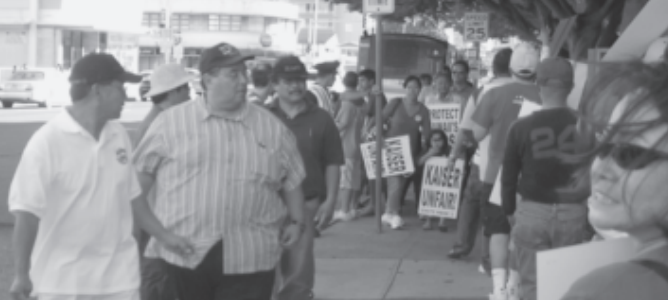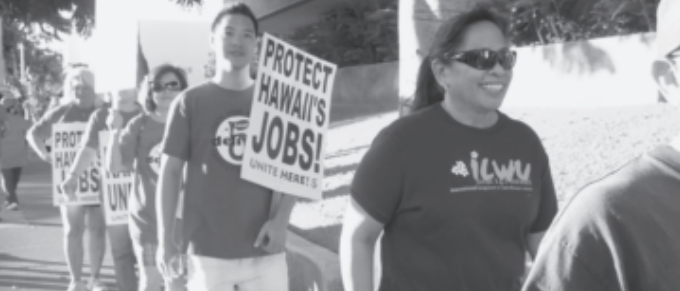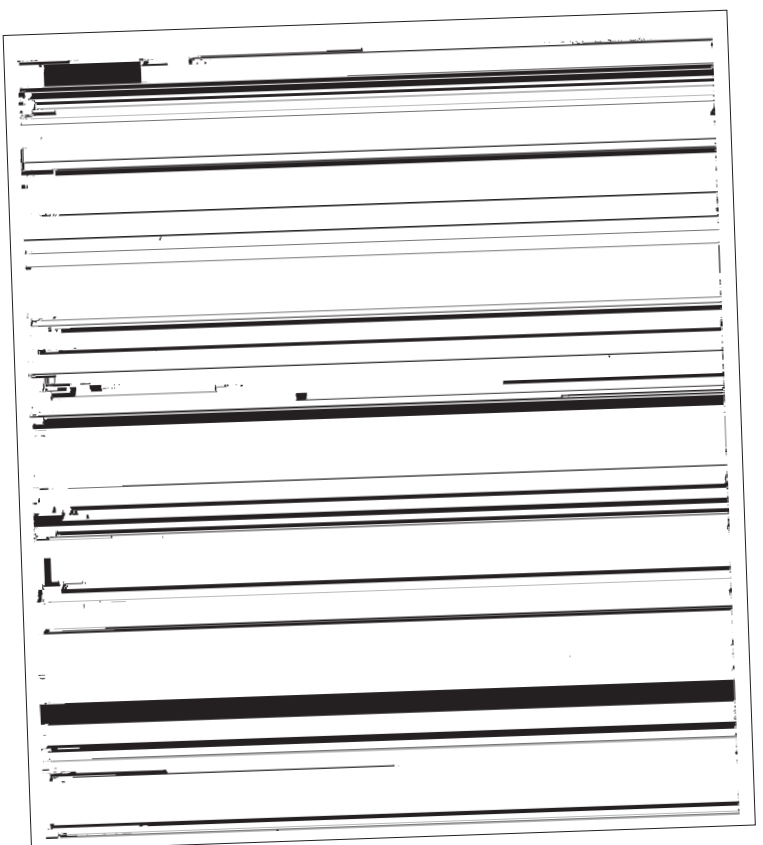

On January 19, 2010, the ILWU and other unions joined a picket and rally supporting UNITE-HERE workers at Kaiser Permanente. The rally at the Honolulu Kaiser Clinic was attended by over 500 union members, mostly members from UNITE-HERE hotels. The massive rally was an impressive demonstration of support and solidarity. The ILWU represents imaging technicians at Kaiser and UNITE-HERE represents pharmacy and other workers. Kaiser is planning to move its mail-order prescription work to Colorado which will cut jobs in Hawaii. Pictured on the left are Dave Mori, Brian Tanaka, and Larry Ruiz. ILWU Vice President Donna Domingo is pictured above. President Isaac Fiesta Jr. was also at the rally.
“Profit is useful if it serves as a means toward an end,” wrote Pope Benedict XVI. “Once profit becomes the exclusive goal, if it is produced by improper means and without the common good as its ultimate end, it risks destroying wealth and creating poverty. The economic development that Paul VI hoped to see was meant to produce real growth, of benefit to everyone and genuinely sustainable.”
“The economy needs ethics in order to function correctly—not any ethics whatsoever, but an ethics which is people-centered.”
The Head of the Catholic Church denounced the drive to outsource work to the cheapest bidder had endangered the rights of workers, and demanded that workers be allowed to organize in unions to protect their rights and guarantee steady, decent employment.
Pope Benedict XVI signed his third encyclical at the Vatican, Monday, July 6, 2009. Benedict XVI criticized the profit-at-all-cost mentality of the globalized economy and lamented that greed has brought about the worst economic downturn since the Great Depression.
Workers need unions
The Pope’s encyclical encouraged and supported the importance of labor unions for working people.
“The repeated calls issued within the Church’s social doctrine, beginning with Rerum Novarum [60], for the promotion of workers’ associations that can defend their rights must therefore be honoured today even more than in the past, as a prompt and far-sighted response to the urgent need for new forms of cooperation at the international level, as well as the local level.”
“Today the subject of development is also closely related to the duties arising from our relationship to the natural environment. The environment is God’s gift to everyone, and in our use of it we have a responsibility towards the poor, towards future generations and towards humanity as a whole.”
No consideration of the problems associated with development could fail to highlight the direct link between poverty and unemployment. In many cases, poverty results from a violation of the dignity of human work, either because work opportunities are limited (through unemployment or underemployment), or “ because a low value is put on work and the rights that flow from it, especially the right to a just wage and to the personal security of the worker and his or her family” [143]. For this reason, on 1 May 2000 on the occasion of the Jubilee of Workers, my venerable predecessor Pope John Paul II issued an appeal for “a global coalition in favour of ‘decent work’ ” [144], supporting the strategy of the International Labour Organization. In this way, he gave a strong moral impetus to this objective, seeing it as an aspiration of families in every country of the world. What is meant by the word “decency” in regard to work? It means work that expresses the essential dignity of every man and woman in the context of their particular society: work that is freely chosen, effectively associating workers, both men and women, with the development of their community; work that enables the worker to be respected and free from any form of discrimination; work that makes it possible for families to meet their needs and provide schooling for their children, without the children themselves being forced into labour; work that permits the workers to organize themselves freely, and to make their voices heard; work that leaves enough room for rediscovering one’s roots at a personal, familial and spiritual level; work that guarantees those who have retired a decent standard of living.”
Pacific Beach Hotel boycott continues—from page 6
immediate relief for the workers, the NLRB went to the Federal District Court in Honolulu on January 7, 2010. They are asking the court to order HTH management to rehire the seven fired workers and resume bargaining with the ILWU.
Cestare told the ILWU the NLRB sees this as an important case and is committed to allocate the resources necessary to seek the court injunction and prepare for the appeal to Washington. At least five NLRB agents are involved in the case—two in Hawaii, two in San Francisco, and one in Washington D.C.
Japan steps up boycott
Japanese supporters of the ILWU workers at the hotel were elated by the NLRB decision and plan to intensify their boycott of the Pacific Beach Hotel. They met with top union leaders of the JTB Group workers union, the Tourism and Air Cargo Committee, and Service Rengo. The leaders agreed to have each travel agent workers union talk to their management about the NLRB decision. Meetings are also being arranged with the Hawaii branches of the major Japan travel agencies.
Local Filipino organizations have also stepped up their boycott of the hotel until HTH Corp. stops violating workers’ rights.


